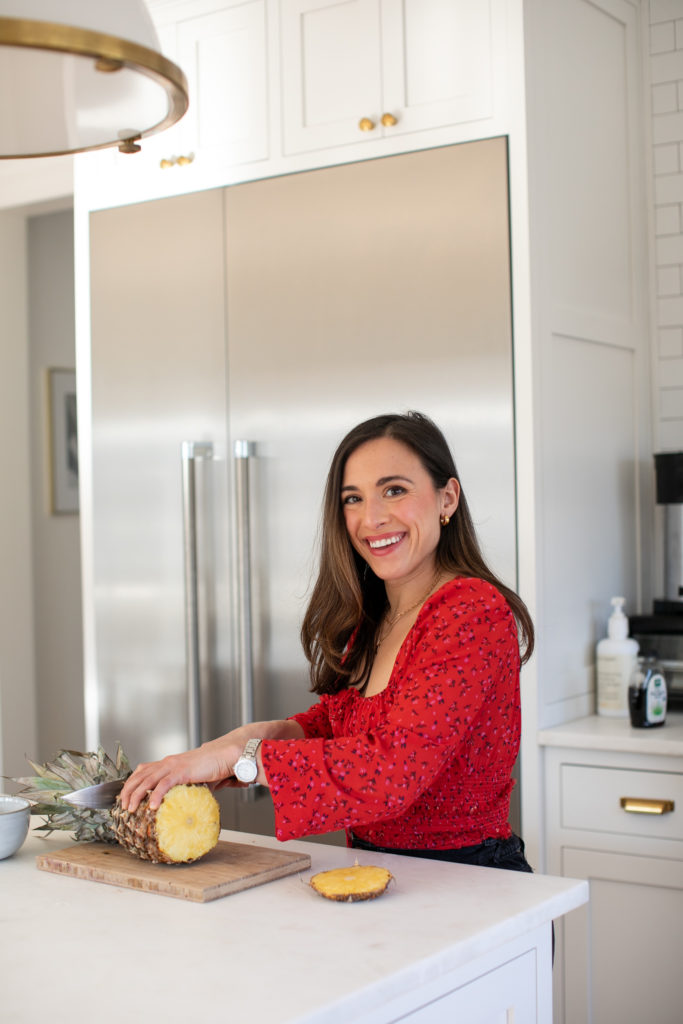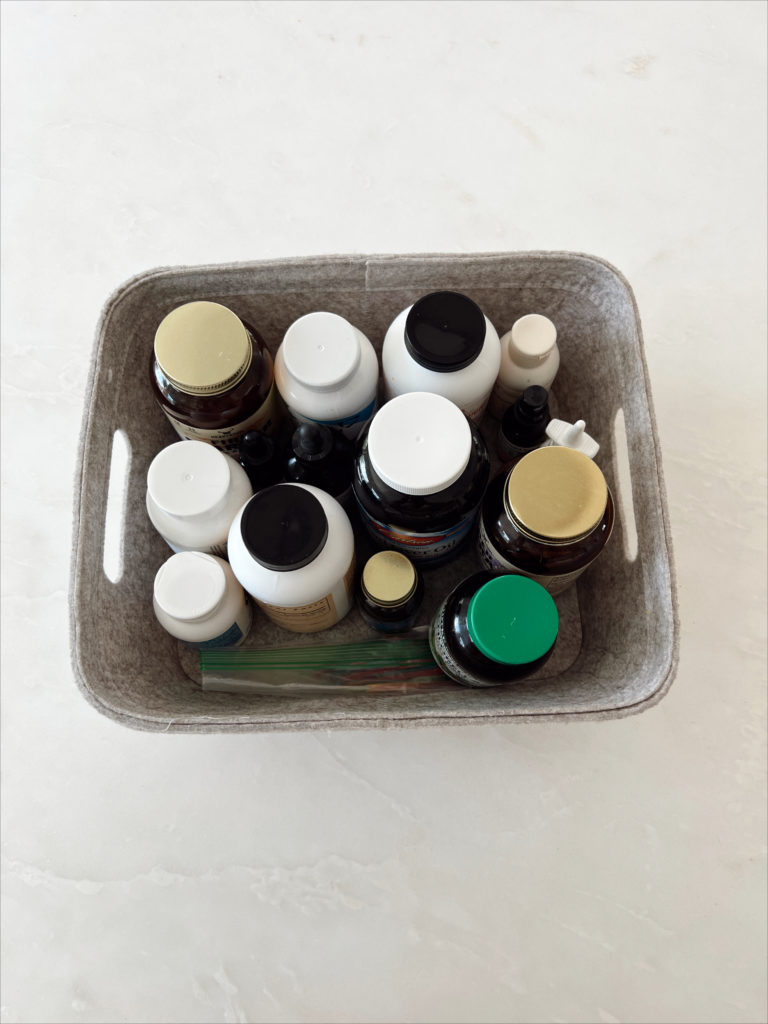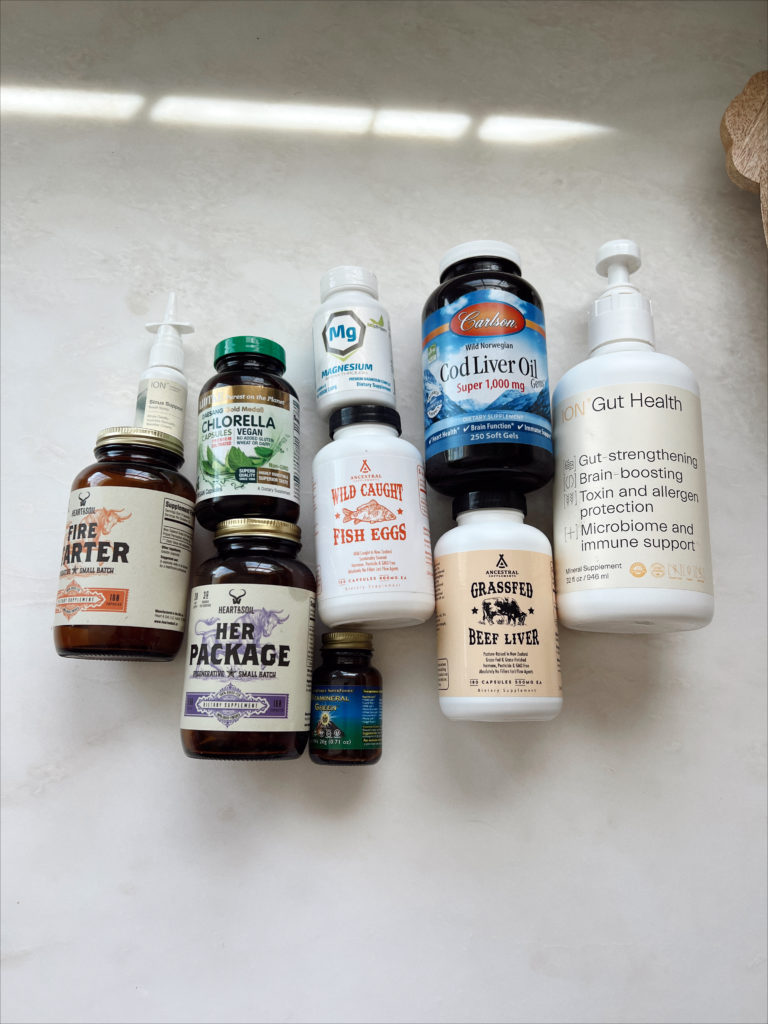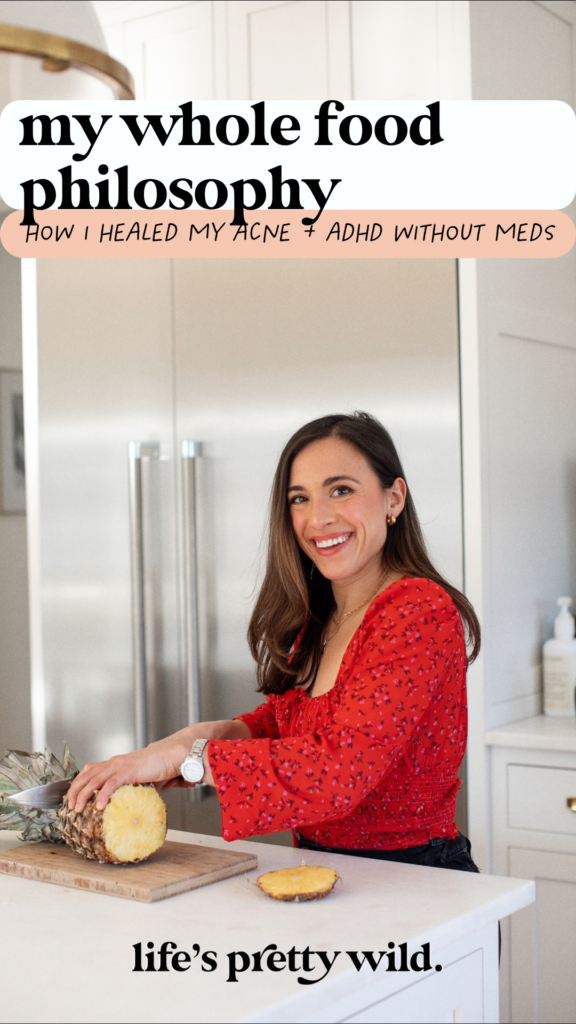In getting super clear on what I wanted this blog to be about, I knew wanted to have some “pillar posts” that lay the foundation for Life's Pretty Wild and this is one of them. If you're new here, I struggled with ADHD most of my life, and was officially diagnosed with it at 19. I took prescription medication for a whole decade until I decided to come off of it when Ryan and I started trying for a baby. It was during my first pregnancy that I decided I no longer wanted to be so reliant on ADHD meds and set off on a quest to manage my ADHD (and my life!) more holistically.
What ensued was a 4+ year journey of shocking revelations, an ocean of tears (both happy and sad), hours and hours of poring over medical research and books, lots of personal experimentation, lab work, and getting help and advice from medical experts. One of the changes that impacted my ADHD the most was my diet. So it's with all of this in mind that I want to share with you my whole food philosophy.
In A Nutshell…
My approach to food is that it should be as close to the source as possible, but don't get it twisted — I firmly believe there is room for packaged and “processed” foods, you just have to learn how to read labels. As a working mom of two toddlers, I don't have hours and hours to spend meal planning, grocery shopping, or prepping elaborate meals from scratch every single day. My philosophy is that food should be nourishing, balanced, convenient, and cost-effective. It's with this simple approach that I've been able to manage my ADHD without medication for over four years — I know that for a fact!
There is room in a whole food diet for everything — even packaged and processed foods — you just have to learn how to read labels!

How Did I Get Here?
Long story short, I didn’t really care what I put in or on my body until I started having kids. (I think a lot of moms can relate to this). It was only then that I started to dive deep (I’m talking real deep) into how my diet and personal care choices were truly affecting me.
Weaning myself off of ADHD meds was HARD — like really hard. Probably harder than the horrible pregnancy nausea I experienced in my first trimester. Not only was I struggling with being newly pregnant but I was literally in withdrawal (physically and mentally) from this drug I had taken for a third of my life. It was then that I decided I never wanted to go back on it again.
It's with *a glimmer in my eye* that I can say I'm coping better now that I ever did when I was taking prescription medication. Of course, I'm still a work in progress and I'll always have to stay on top of it, but I've come as close and I can possibly get to “reversing” my ADHD. I no longer struggle with focus, mood, or productivity. I'm excited to tackle projects every day. I no longer suffer from debilitating distractedness, procrastination, and overwhelm. Honestly, I'm a different person than I was four years ago.
The biggest change? My diet.
I'm not talking about a diet diet. I didn't set out to lose weight. I'm talking about the actual food choices I make everyday and yes, there is still room for pizza, pasta, ice cream, and all the fun stuff.
My ADHD-Inducing Diet
My diet has evolved A LOT over the last ten years. At the height of my ADHD symptoms, I was running on white pasta, supposedly “healthy” high-sugar protein bars, and lots and lots of refined carbs. In my twenties, I genuinely thought that I was making wise decisions by choosing Diet Coke over regular and low-fat everything.
Granted, my Portuguese and Brazilian parents ingrained in me a sense of what healthy eating looked like — growing up, dinner always included a protein, multiple vegetables, and a carb — so I wasn't totally in the dark. Only this didn't always carry over to other meals, and certainly not when I was living on my own pre-kids.
Never one to shy away from fad diets and trends, I've tried everything from Kim Kardashian's Quick Trim to Beyonce's Master Cleanse to going fully vegan and also fully carnivore (yes, I've been on opposite ends of the spectrum). I didn't know it then, but this kind of unscientific yo-yo dieting only worsens symptoms, sorry Kim K fans *womp womp.*
From ADHD to Med-Free
Listen, I'm not a doctor nor do I play one on TV, but since I decided four years ago that I no longer wanted to be on ADHD meds, I've done EXTENSIVE research into what foods/supplements/lifestyle choices make a difference in my focus, mood, and productivity.
Along the way, I've learned a lot about food and picked up some habits that actually make sense. I now routinely get bloodwork done and I've done a couple hair mineral analyses to see what's going on inside. I've also done a gut cleanse and a heavy metal detox. I didn't do all of this on my own, I work closely with a functional medicine practitioner who gets annoying texts and calls from me constantly (hi, Dr. Vincent! ♀️). So what I'm going to share with you is rooted in research and trial and error, not random Instagram advice. I'm certainly not telling you what to do, but want to share what's worked for me.
Whole Foods Made Simple
Paleo, keto, vegan, oh my! Listen friends, I knowwwwww healthy eating can seem so darn complicated, but I pinky promise it doesn't have to be that way. The reason my body (and therefore my brain) was so angry at me all those years was because I wasn't giving it what it craved: real, whole goodness. Pure food that's as close to the source as possible. Food that it understands. Food that it can digest. Food that it was designed to consume.
Okay so most of us get that part. More whole foods, less processed. But then there's this other picture of holistic health that we see all over social media: “I harvested this salad of micro greens in my hydroponic garden and topped it with these organic pasture-raised eggs from the chickens in my backyard.”
What the what??? Who has the time?!
Don't get me wrong, I love experimenting with all the bougie, trendy health foods, but they do not make up the bulk of my diet and they haven't impacted my ADHD one bit. What I'm talking about is eliminating the triggering inflammatory foods and stocking my fridge, freezer and pantry with simple staples.
My Golden Grocery Rules
- Quality matters. For health, ethical, and environmental reasons, opt for high quality foods like organic fruits and veggies, pasture raised eggs, and grass-fed meats. A lot of people are convinced that organic and grass-fed everything is unaffordable, but that's often not the case. I don't buy all of my groceries at Whole Foods (who does?!). I've learned to get creative in order to save money: by shopping local meats from regenerative farms directly or at farmer's markets, getting the most out of my Thrive Market membership, and buying certain staples like dates, nuts, and nut flours in bulk.
- Stick to the perimeter of the store. Most grocery stores are stocked this way: whole foods on the perimeter, processed foods in the aisles. Don't get me wrong, I still go to town on a bag of chips and salsa or cookies from time to time, but I try to keep my snacking as close to the source as possible. Once you eliminate little by little, you'll be shocked to find you don't really miss your old comfort foods!
- Learn to read labels. The sad truth is that food companies are sneaky. Even “healthy” foods like yogurt and granola can come with unnecessary additives like refined sugar, seed oils, and even artificial dyes and flavors. My rule of thumb: stick to as few ingredients as possible. Ingredients you can easily identify and pronounce. Here's a yogurt example of what I'm talking about:


- Eliminate industrial seed oils ♀️. This is the ONE item that I say is totally off limits. There's room for sugar. There's room for pizza. But toxic seed oils (like Canola, Corn, Cottonseed, Soybean, Sunflower, Safflower, Grapeseed, and Rice bran) are some of the most inflammatory and triggering foods — for anyone, but especially if you have ADHD. There is a clear trigger for me (as well as lots of research) to back up why removing these should be a top priority.
- Test, don't guess. One of my TOP recommendation is to get bloodwork done and to do an Organic Acids test to see what's actually going on in your body. You will likely need a health practitioner to read the results for you because it won't make any sense to a lay person. For some results, a high value is good, for others, a high value is bad. Just do yourself a favor and have a professional read it — it's not worth the headache!
- Experiment, experiment, experiment. I'm not sold on food sensitivity tests, so I think the most accurate way to see if a food is triggering is to try an elimination diet. Inflammation plays a HUGE role in you ability to focus. Do you suspect that gluten doesn't sit well with you? Try eliminating it for a month and see what happens. Then re-introduce it and take note of your productivity level.
My ADHD-Friendly Whole Foods Shopping List
Fruits + Veggies
Experts suggest eating about ~40 different species of plants a week for optimal microbiome diversity. (Note: a fuji apple and gala apple count as 2 species.) One easy way we do this is with smoothies and salads!
- My go-to's: lemons, apples, bananas, pears, berries, mangoes, grapes, cherries. I try to pick a new fruit every time I go to the store. I love when they have exotic ones like stock like dragon fruit, papaya, and pomegranate. They're expensive but 1 or 2 will do the trick!
- For roasting: onions, shallots, brussel sprouts, asparagus, carrots, leeks, sweet potatoes
- Salad supplies: kale is my go-to but I also usually stock my freezer with frozen spinach for sautéing and adding to smoothies. I also like arugula and good ole' butter lettuce for topping burgers and lettuce wraps
- Herbs: cilantro, sage, parsley, mint, rosemary, thyme
- Garlic & ginger
A trend I refused to get behind until Dr. Vincent recommended it: 16 oz of celery juice every morning. I thought it was just a fad and am not one to hop on any bandwagon without a good enough reason, but I tried it and it actually does make a difference in my day. Call it a placebo, call it pseudoscience, call it whatever you want, but I've had success with it so i'mma keep juicin'
Meat + Seafood
I experimented with a carnivore diet and although I think Dr. Paul Saladino and others make some VERY compelling points about it, I find that my body/mood/focus does well with lots of fruits and veggies! Although I no longer follow it, the carnivore diet taught me the importance of eating high quality meat and animal products, which includes…
- organic grass-fed, grass-finished beef and lamb, preferably from regenerative farms. Take a look a this blog post to read why I'm so obsessed with Regen Ag.
- organic pasture raised chicken and eggs
- wild turkey (hard to come by but sometimes I can get it at a butcher or directly from a farm)
- “smaller” fish like sardines and anchovies. I do love tuna but eat it sparingly because it's one of the fish that's highest in heavy metals
- wild caught salmon
- wild caught shrimp
- Bones for bone broth — literally nature's botox!
It's hard to get high-quality meat on a budget so I've learned some tricks along the way: source your meat directly from local farms, it helps to support local and you can often get better prices. Visit farmers markets. Buy in bulk and store in your freezer. I'll never forget a line I heard in a podcast about regenerative agriculture: Either pay your farmer now, or pay your doctor later.
Dairy
- butter, ghee, or beef tallow
- whole fat yogurt
- organic whole milk (I don't buy almond milk because most are loaded with additives like carageenan and the good ones are crazy expensive. I just make my own almond milk when I'm craving it!)
- high quality cheese — I prefer raw parmesan and goat cheese
Fridge/Pantry Staples
- olive oil
- apple cider vinegar
- coconut aminos — I put this on EVERYTHING. So yummy. It's like a healthy soy sauce
- natural sweeteners: coconut sugar, honey, maple syrup
- sauces and condiments (again, be wary of unwanted additives)
- almond butter
- canned tomatoes
- coconut milk
- tomato sauce
- seeds: flax, chia, hemp, pumpkin, sunflower
- beans: black beans, chickpeas, lentils
- nutritional yeast
- high quality salt — I like Jacobsen's (cheapest price I found, you can save 10% when you buy 2 or more)
- Spices: thyme, crushed red pepper, pepper, garlic, onion, chili, etc.
Grains
- Sourdough bread
- Plant-based pasta
- Rice: jasmine, black
- Quinoa
- Oats
- Flours: almond, oat
Supplements
Oh supplements. The 56 billion dollar buzzword. I cannot stress this enough: be very wary of supplement recommendations people make online and on social media. I think *for the most part* people have good intentions, but they're simply misinformed. Supplements are not one-size-fits-all. What works for one person could actually be harmful for another (like in the case of too much zinc or silver for example).
This is again where I recommend getting lab work done — it's the only way you'll really know what's going on and what your body is missing. Often ADHD symptoms creep up when your body is missing certain vitamins or minerals, or if you have a mold, yeast, or heavy metals present, those need to be addressed right away!
With that very prominent disclosure, here are the supplements that have helped with my ADHD. Be sure to ask your healthcare practitioner about them! I prefer whole food supplements over synthetic ones, and these are the ones I'm loving lately:

- Ion Gut Health & Sinus Support
- Vitamineral Green
- Ancestral Supplements Grassfed Beef Liver
- Ancestral Supplements Wild Caught Fish Eggs
- Heart and Soil Her Package
- Heart and Soil Firestarter (not pictured — need a restock on this ASAP!)
- Carlson Cod Liver Oil
- BioOptimizers Magnesium
- Chlorella (I don't take this daily, it was just for the heavy metal detox protocol)
- Collagen — I make my own collagen gummies. Get the recipe here!

I don't take all of my supplements every single day, I alternate them (as recommended by Dr. Vincent). It's also more cost-effective to do it that way!
Inspiration & Further Research
I believe wholeheartedly in the benefits of whole foods recipes (with options!), focusing on organic, regenerative farming. It benefits not only people but also the planet.
It’s not the things that we do once or twice, it’s what we do every single day that adds up. Make small changes at first, and believe me, you will see the light at the end of the tunnel, just like I did.
There are several documentaries, books, people, and podcasts really changed the way I look at nutrition and personal care. You’ll find that clean eating and clean products often go hand in hand when you start looking into them. I highly recommend checking them out for yourself to form your own opinions and conclusions. For me, it was hard to forget what I learned.
Documentaries
Books
Podcasts
People
The following people really opened my eyes to the impact of a whole foods diet and clean products . I don’t agree with every single thing they’ve ever said or follow their advice to the letter, but they are definitely interesting people and offer some really well-researched insight:
- Dr. Zach Bush, internationally renown educator and founder of the Seraphic Group (honestly, this guy alone will blow your mind)
- Dr. Mark Hyman, New York Times bestselling author, host of the Doctor’s Pharmacy, coined the Pegan diet
- Dr. Paul Saladino, host of the Fundamental Health podcast and author of the Carnivore Code
- Vani Hari, New York Times bestselling author and creator of Food Babe
- Liz Floyd, founder of The Hive
- Lacy Phillips, host of the Expanded podast and founder of To Be Magnetic (she is a manifestation guru but is also super into clean living and her product recommendations are always super well-researched)
- Sami Carrick, founder of Sunnyseed Co.
- Kayla Barnes @kaylabarnes on Instagram
- Ash and Sarah @strong.sistas on Instagram and on their website

Comments +